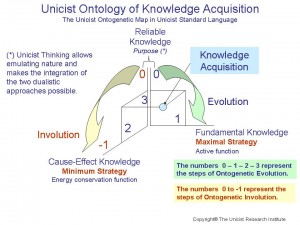Having reliable knowledge is a precondition for decision making for business expansion. But this includes an apparent paradox. The knowledge of the ontogenetic map (fundamental knowledge) is the basis for growth, whilst most of the people consider that the problem should be approached with technical analysis.
 Reliable knowledge is necessary when individuals are willing to ensure a minimum strategy or are exposed to uncertain or risky environments.
Reliable knowledge is necessary when individuals are willing to ensure a minimum strategy or are exposed to uncertain or risky environments.
In every day activity only operational knowledge is required.
This ontogenetic map is a final synthesis of the use of fundamental and technical analysis in the world of economic, social and business behavior.
Fundamentals describe the ontology of a given reality considered as a unified field. Technical analysis describes the cause-effect relations of a reality considered as a systemic object.
When the context is uncertain the understanding of fundamentals is necessary. Fundamentals are defined by the concepts that regulate the evolution of a fact.
Validation processes naturally degrade into fallacies when they do not include falsification processes. Validation implies a non-destructive test and falsification is a destructive test measuring the accuracy and limits of a knowledge.
When a reliable knowledge is required to deal with maximal and minimum strategies, risks or uncertainty, the integration of technical and fundamental analysis is required, beginning with the fundamentals.
NOTE: The Unicist Research Institute was the pioneer in complexity science research and became the major research organization in the world in the field of human adaptive systems. More than 4,000 unicist ontological researches were developed since 1976 until July 2011 in the field of individual, institutional and social evolution. They included the development of the unicist ontogenetic maps (DNA) of institutions.
